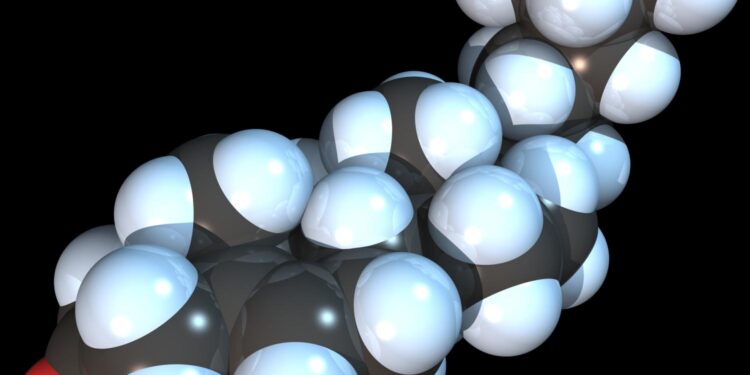Space-filling model of the cholesterol molecule. Credit: RedAndr/Wikipedia
In a groundbreaking study, a team led by Professor José Pedro Friedmann Angeli from Würzburg showed that the cholesterol precursor 7-dehydrocholesterol (7-DHC) plays a crucial role as an antioxidant: it integrates into cell membranes and protects cells by preventing a certain type of cell death, known as ferroptosis.
“Until now, 7-DHC accumulation has only been associated with neurodevelopmental defects. We now show that it actually increases cellular fitness and could promote more aggressive behavior in cancers such as Burkitt’s lymphoma and neuroblastoma,” explains Friedmann Angeli.
The newly discovered protective function of 7-DHC opens exciting prospects for further improving the treatment of cancer and other diseases associated with ferroptosis. “This gives us new opportunities to test potential inhibitors targeting cholesterol biosynthesis and already established in medical practice.”
The researchers report this in the journal Nature. In addition to the Würzburg team from the Rudolf Virchow Zentrum—Center for Integrative and Translational Bioimaging, the following scientists contributed to the study: Dr. Maria Fedorova (Dresden University of Technology), Marcus Conrad (Helmholtz Munich), Derek Pratt ( University of Ottawa), as well as Andreas Trumpp and Hamed Alborzinia (German Cancer Research Center, DKFZ Heidelberg).
Observe changes in 7-DHC levels
High cholesterol levels are associated with health problems such as heart disease and diabetes. Most studies focus on how cholesterol directly contributes to these diseases.
In this area, the discovery of the cholesterol precursor 7-DHC as an antioxidant opens new possibilities: studies on changes in 7-DHC levels could provide crucial new information on these diseases. Additionally, drugs that specifically block 7-DHC production should be investigated in combination with other drugs, which could have a positive effect in the treatment of certain cancers.
Possible effects on tumor development
“Our next research goal is to study the effects of 7-DHC accumulation during tumor development,” explains José Pedro Friedmann Angeli, ferroptosis expert in Würzburg.
The team responsible for publishing in Nature also calls for more in-depth epidemiological studies.
There are medications approved by the U.S. Food and Drug Administration (FDA) that can inhibit the DHCR7 enzyme. These include trazodone, which is prescribed about 20 million times a year in the United States, sometimes even for off-label use to treat insomnia.
“Studies have shown that people taking this medicine have elevated plasma levels of 7-DHC. Epidemiological studies are crucial to better understand the possible effects,” explains Friedmann Angeli.
These studies would help determine whether there is a link between groups of patients who regularly take ferroptosis-modulating medications such as trazodone and cancer incidence, metastasis, or other critical public health issues.
More information:
José Angeli, 7-dehydrocholesterol is an endogenous suppressor of ferroptosis, Nature (2024). DOI: 10.1038/s41586-023-06878-9. www.nature.com/articles/s41586-023-06878-9
Provided by the University of Würzburg
Quote: Cholesterol precursor protects cells from ferroptosis, according to a study (January 31, 2024) retrieved January 31, 2024 from
This document is subject to copyright. Except for fair use for private study or research purposes, no part may be reproduced without written permission. The content is provided for information only.



